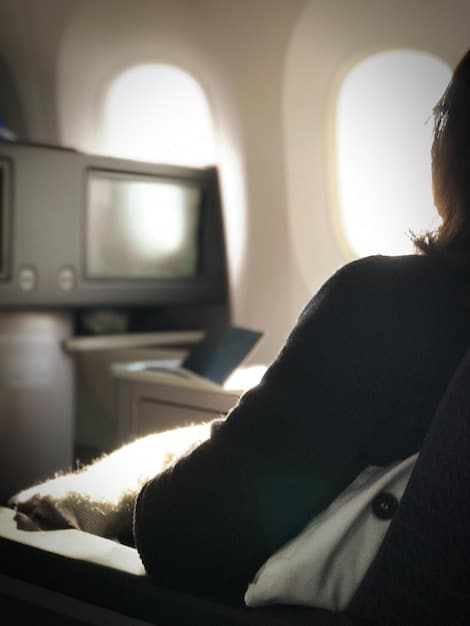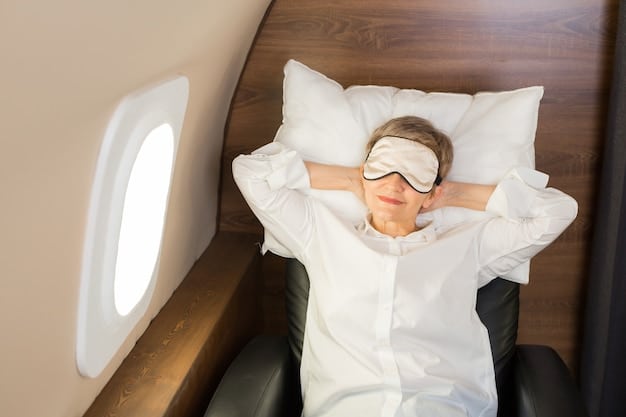Beat Jet Lag: 5 Scientifically Proven Tips for a Faster Recovery

Beat jet lag with these five scientifically proven tips, including strategic light exposure, adjusting your sleep schedule, hydrating effectively, timing your meals, and utilizing short-term sleep aids, to help you recover faster and enjoy your travels more.
Jet lag can turn a dream vacation into a tired blur. But what if you could minimize its impact and start enjoying your trip sooner? This guide unveils five scientifically proven tips to help you beat jet lag and recover faster.
Understand Jet Lag and How It Affects You
Jet lag, also known as desynchronosis, is more than just feeling tired after a long flight. It’s a physiological condition that occurs when your body’s internal clock, or circadian rhythm, is disrupted due to rapid travel across multiple time zones. This disruption can lead to a variety of uncomfortable symptoms that can significantly impact your travel experience.
When you fly across time zones, your body’s natural sleep-wake cycle is thrown off balance. Your internal clock, which regulates hormone release, body temperature, and other bodily functions, is still operating on the schedule of your origin location. This mismatch between your internal rhythm and the new environment causes the symptoms we recognize as jet lag.
Common Symptoms of Jet Lag
Jet lag manifests differently in individuals, but some common symptoms include:
- Sleep disturbances: Difficulty falling asleep or staying asleep at the appropriate times.
- Daytime fatigue: Feeling excessively tired and sluggish during the day.
- Gastrointestinal issues: Changes in appetite, indigestion, or constipation.
- Cognitive impairment: Difficulty concentrating, making decisions, or remembering things.

Why Jet Lag Varies in Severity
The severity of jet lag can depend on several factors:
- Number of time zones crossed: The more time zones you cross, the more severe the jet lag is likely to be.
- Direction of travel: Traveling eastward is generally considered more difficult than traveling westward. This is because it’s easier to delay your sleep cycle than to advance it.
- Individual susceptibility: Some people are simply more prone to jet lag than others. Factors such as age, health, and personality can all play a role.
- Pre-existing sleep habits: Those with irregular sleep schedules prior to travel may experience more intense jet lag.
Understanding the causes and symptoms of jet lag is the first step to mitigating its effects. By implementing scientifically proven strategies, you can minimize the disruption to your body’s natural rhythms and enjoy a smoother transition to your new time zone.
Tip 1: Strategic Light Exposure for Circadian Reset
Light is the most powerful cue for regulating your circadian rhythm. Manipulating your exposure to light can significantly influence how quickly you adjust to a new time zone. The key is to expose yourself to light at times that will help shift your internal clock in the direction you want it to go.
Upon arriving at your destination, determine the appropriate times for light exposure. If you’ve traveled east, you’ll generally want to seek out bright light in the morning to advance your circadian rhythm. Conversely, if you’ve traveled west, you’ll want to avoid morning light and seek out light in the evening to delay your circadian rhythm.
How to Use Light to Your Advantage:
- Eastward Travel: Expose yourself to bright light in the morning upon arrival. This helps your body adjust to the earlier sunrise. Conversely, avoid bright light in the evening.
- Westward Travel: Avoid bright light in the morning and seek it out in the evening. This helps your body adjust to the later sunset.
- Use Light Therapy: Consider using a light therapy box, also known as a SAD (Seasonal Affective Disorder) lamp, to supplement natural light exposure. These devices emit a bright, artificial light that can help regulate your circadian rhythm.
- Blue Light Blocking Glasses: In the evenings, especially when traveling east, use blue light blocking glasses to minimize exposure to blue light emitted from screens.
It’s important to note that consistency is key. To maximize the effectiveness of strategic light exposure, stick to a consistent schedule, exposing yourself to light or avoiding it at the same times each day.
By strategically manipulating your light exposure, you can effectively reset your circadian rhythm and minimize the disrupting effects of jet lag, allowing you to adapt more quickly to your new environment and enjoy your travels to the fullest.
Tip 2: Adjust Your Sleep Schedule Gradually Before You Fly
One of the most effective strategies for minimizing jet lag is to prepare your body for the time zone change before you even depart. This involves gradually adjusting your sleep schedule in the days leading up to your flight. By making small adjustments ahead of time, you can ease the transition to your new time zone and reduce the severity of jet lag symptoms.
If you’re traveling east, start going to bed and waking up earlier in the days leading up to your trip. Conversely, if you’re traveling west, start going to bed and waking up later. The amount you adjust your schedule will depend on the number of time zones you’re crossing.
Make Small Adjustments Each Day
- Eastward Travel: Shift your bedtime and wake-up time earlier by 30 minutes to an hour each day for several days before your flight.
- Westward Travel: Shift your bedtime and wake-up time later by 30 minutes to an hour each day.
- Meal Timing: Adjust your meal times to align with your new sleep schedule. This helps signal your body that it’s time to shift its internal clock.
- Stay Consistent: Even on weekends, stick to your adjusted sleep schedule to reinforce the shift in your circadian rhythm.

Tools and Apps to Help
There are several apps and tools available that can help you plan and track your pre-travel sleep schedule adjustments. These tools can provide personalized recommendations based on your travel itinerary and help you stay on track.
Adjusting your sleep schedule before you fly is a proactive approach to minimizing jet lag. By taking the time to prepare your body for the time zone change, you can significantly reduce the disruption to your circadian rhythm and arrive at your destination feeling more rested and ready to enjoy your trip.
Tip 3: Hydrate Effectively Before, During, and After Your Flight
Dehydration can exacerbate the symptoms of jet lag, so maintaining optimal hydration levels is crucial for a faster recovery. The dry air in airplane cabins can quickly lead to dehydration, and this can worsen feelings of fatigue, headache, and cognitive impairment associated with jet lag. Proper hydration helps your body function optimally and can make the transition to a new time zone much smoother.
Start hydrating well in advance of your flight. Avoid excessive caffeine and alcohol, as these can have a dehydrating effect. During the flight, drink plenty of water and consider bringing a reusable water bottle to refill.
How to Stay Hydrated:
- Pre-Flight Hydration: Drink plenty of water in the days leading up to your flight.
- Avoid Dehydrating Beverages: Limit your consumption of caffeine and alcohol, especially during the flight.
- In-Flight Hydration: Drink water regularly throughout the flight. Avoid relying solely on the beverage service; bring your own water.
- Post-Flight Hydration: Continue to hydrate well after you arrive at your destination.
Electrolyte-rich beverages can also be beneficial, especially after a long flight. Electrolytes help regulate fluid balance and can aid in rehydration. Consider packing electrolyte tablets or a sports drink.
Staying properly hydrated is a simple but effective way to combat jet lag. By ensuring your body has the fluids it needs to function optimally, you can minimize the severity of jet lag symptoms and recover more quickly.
Tip 4: Time Your Meals to the New Time Zone
Your body’s internal clock isn’t solely regulated by light exposure. Meal times also play an important role in setting your circadian rhythm. By strategically timing your meals to align with the meal times of your new time zone, you can help signal your body that it’s time to adjust.
Upon arrival, try to eat your meals at the times that are appropriate for your new location, even if you aren’t feeling hungry. This helps reinforce the new schedule and encourages your body to adapt. Avoid snacking at odd hours, as this can disrupt your body’s internal cues.
Strategies for Meal Timing:
- Adjust Meal Times Gradually: In the days leading up to your flight, start adjusting your meal times to align with the meal times of your destination.
- Eat at Appropriate Times: Upon arrival, eat your meals at the times that are appropriate for your new location, even if you aren’t feeling hungry.
- Avoid Snacking at Odd Hours: This can disrupt your body’s internal cues.
- Choose Healthy Foods: Opt for nutritious foods that will help you feel energized and support your body’s recovery.
Some research suggests that fasting for a period before your first meal in the new time zone can also help reset your circadian rhythm. However, this approach may not be suitable for everyone, particularly those with underlying health conditions. Consult with a healthcare professional before trying intermittent fasting.
Timing your meals strategically can be a powerful tool in combating jet lag. By aligning your eating schedule with your new time zone, you can provide your body with important cues that accelerate the adjustment process.
Tip 5: Consider Short-Term Sleep Aids to Regulate Sleep
In some cases, short-term sleep aids can be helpful for regulating your sleep cycle and mitigating the effects of jet lag. These aids can help you fall asleep and stay asleep at the appropriate times, allowing your body to adjust more quickly to the new time zone. However, it’s important to use these aids judiciously and under the guidance of a healthcare professional.
Melatonin is a hormone that regulates sleep-wake cycles, and it’s available as an over-the-counter supplement. Taking melatonin at the appropriate time can help shift your circadian rhythm. Consult with a doctor to determine the appropriate dosage and timing for your specific travel itinerary.
Types of Sleep Aids and How to Use Them Responsibly
- Melatonin: A hormone that regulates sleep-wake cycles. Take it a few hours before your desired bedtime in the new time zone.
- Prescription Sleep Medications: In some cases, a doctor may prescribe a short-term sleep medication to help with jet lag. These medications should be used sparingly and only under medical supervision.
- Herbal Remedies: Some people find herbal remedies like valerian root or chamomile to be helpful for promoting relaxation and sleep. However, the effectiveness of these remedies can vary.
- Consult a Doctor: Always consult with a healthcare professional before using any sleep aid, particularly if you have underlying health conditions or are taking other medications.
Establishing a relaxing bedtime routine can also improve the effectiveness of sleep aids. This might include taking a warm bath, reading a book, or practicing relaxation techniques.
Short-term sleep aids can be a valuable tool in managing jet lag, but they should be used responsibly and in conjunction with other strategies like strategic light exposure and meal timing. Consult with a healthcare professional to determine the best approach for your individual needs.
| Key Point | Brief Description |
|---|---|
| ☀️ Light Exposure | Adjust light exposure to shift your circadian rhythm. |
| ⏰ Sleep Adjustment | Gradually adjust sleep schedule before your flight. |
| 💧 Hydration | Stay hydrated before, during, and after your flight. |
| 🍽️ Meal Timing | Time meals to the new time zone. |
Frequently Asked Questions (FAQ)
▼
Jet lag is a temporary sleep disorder that occurs when you travel across multiple time zones, disrupting your body’s natural sleep-wake cycle, the circadian rhythm. It leads to fatigue, insomnia, and other symptoms.
▼
Recovery time varies, but generally, it takes about one day per time zone crossed to fully recover from jet lag. However, the tips mentioned can help speed up the adjustment.
▼
Traveling west is typically easier on your body’s clock than traveling east. When traveling west, you are essentially lengthening your day, which is easier to adjust to.
▼
Yes, diet can influence jet lag. Eating meals at the right times in your new time zone and staying hydrated can help regulate your body’s internal clock and reduce jet lag symptoms.
▼
Yes, several apps help with jet lag by providing recommendations for light exposure, sleep schedules, and meal times. These apps can personalize strategies for your travel itinerary.
Conclusion
By implementing these five scientifically proven tips – strategic light exposure, adjusting your sleep schedule, hydrating effectively, timing your meals, and considering short-term sleep aids – you can significantly minimize the impact of jet lag and enjoy a faster, smoother recovery, ensuring you make the most of your travel experiences.





